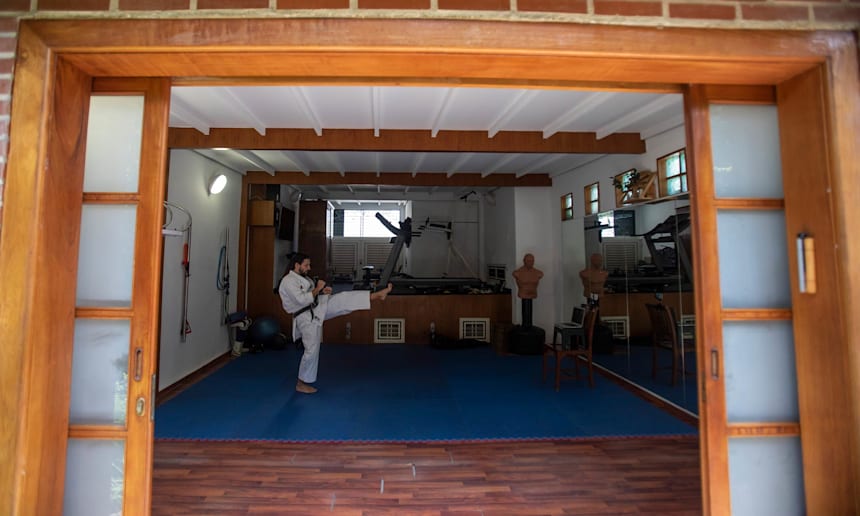Baby son points the way through COVID-19 for legendary karateka Antonio Díaz
Veteran karateka Antonio Díaz may have been waiting his whole career to take part in the Olympic Games, but the news that he will have to hold on for one more year prompted not dismay but a shrug of the shoulders and even a few grins from one member of the Venezuelan’s household...
“It’s very motivating because he smiles every time I do my exercises,” karate’s two-time world, Pan-American Games and World Games champion Antonio Díaz said as he revealed how his eight-month-old son, Antonio Junior, is helping him cope with the impact of the COVID-19 pandemic.
“I have been doing some things with him, some exercises. Sometimes I use him as a resistance weight. He seems to really enjoy it.”
Just days before high-performance competition was suspended, the 39-year-old Díaz won silver in the men’s kata at the World Karate Federation (WKF) Karate-1 Premier League stop in Dubai to mathematically confirm his spot at Tokyo 2020. It was the culmination of an international career that started in earnest with a first Pan-American Games title back in 2003.
While the subsequent postponement of the next Olympic Games means Díaz will have to stay fit and in form for another year, he is determined to embrace the new reality with as much fervour as his son.
“Tokyo was going to be my last competition. I was going to retire then. I did have three competitions left – the Pan-American Championships in May, maybe one tournament in the WKF World League and the Olympics,” Díaz said. “Now, when they resume the calendar, I will have to do some more tournaments, even one more world championship. But I am seeing it as something exciting, a new challenge.”
Díaz’s relatively advanced age gives him another reason to welcome the unexpected time he now has on his hands.
“I can rest from almost one-and-a-half years of competitions to qualify,” said the man who finished third out of the eligible athletes in the men’s kata standings in the first phase of the WKF’s Olympic qualification schedule. “This year I had three months set aside for training because the qualification period was so hard. Now, seeing it in a positive way, I am able to have more time to focus on the things I really want to work on.
“Before, maybe I had one month to work on something. Now, I have many more months. You always need to practise technique and you are always improving, but my physical fitness is something I really need to work on, especially to keep my form to stay one more year.”
Díaz returned to Venezuela in early March, just days before flights in and out were suspended. While he, his wife and Antonio Junior were delighted to be reunited after an absence of six weeks, Díaz initially found the uncertainty difficult to handle. His wife kept him going, kept him off the sweets – a self-confessed “weakness” – and urged him to get creative.
“I have a small dojo in my parents’ house so I did some sessions there the first week, but I preferred to go into self-isolation because my father is at risk. So I brought some mats to my apartment and put them in the living room,” said Díaz, who lives on the eighth floor of a residential block in Caracas.

“I use the couch to do some push-ups or lunges. I use some chairs from the kitchen. It’s interesting. Now there is not that big pressure that we have the Olympics this year I am trying to enjoy it, make sure I have some fun.”
Fun is central to a man intent on soaking up every opportunity life throws at him. It also helps that 30-plus years in karate have underlined that there is nothing to be gained from rushing.
“Of course, karate teaches you to be patient,” Díaz confirmed. “We work a lot with concentration. Training for kata is repeating, repeating, repeating, and you have to be very patient to improve something by a very small amount.”
It is a mantra the 2010 and 2012 world champion is passing on to budding Venezuelan karatekas, even during the lockdown.
“I have a karate school. Usually I have instructors working for me, but I have been doing some online classes and organising classes for other instructors,” Díaz explained. “We have all ages, but mainly our students are kids. Of course, we are trying to be in contact with their parents because they are the ones organising it for them. Some of the parents do it too – we are pushing that.
“It’s been popular but sometimes it’s difficult because the internet connection here in Venezuela is not the best. We are trying. We want to entertain them and keep the rhythm of practice. We had around 20 in the last class I gave.”
This, along with training between the furniture, looking after his baby son and walking the dog once a day in the nearest park, is keeping Díaz fully occupied. But as the months pass and Tokyo 2020 starts to loom once more, there is likely to be just one thing on the Venezuelan’s mind.
“Many people were writing to me a bit worried, saying, ‘Ah, now you have to wait one more year [to retire]’, but I have been waiting for karate to be in the Olympics for more than 20 years,” Díaz said. “So one more year is no problem for me.”